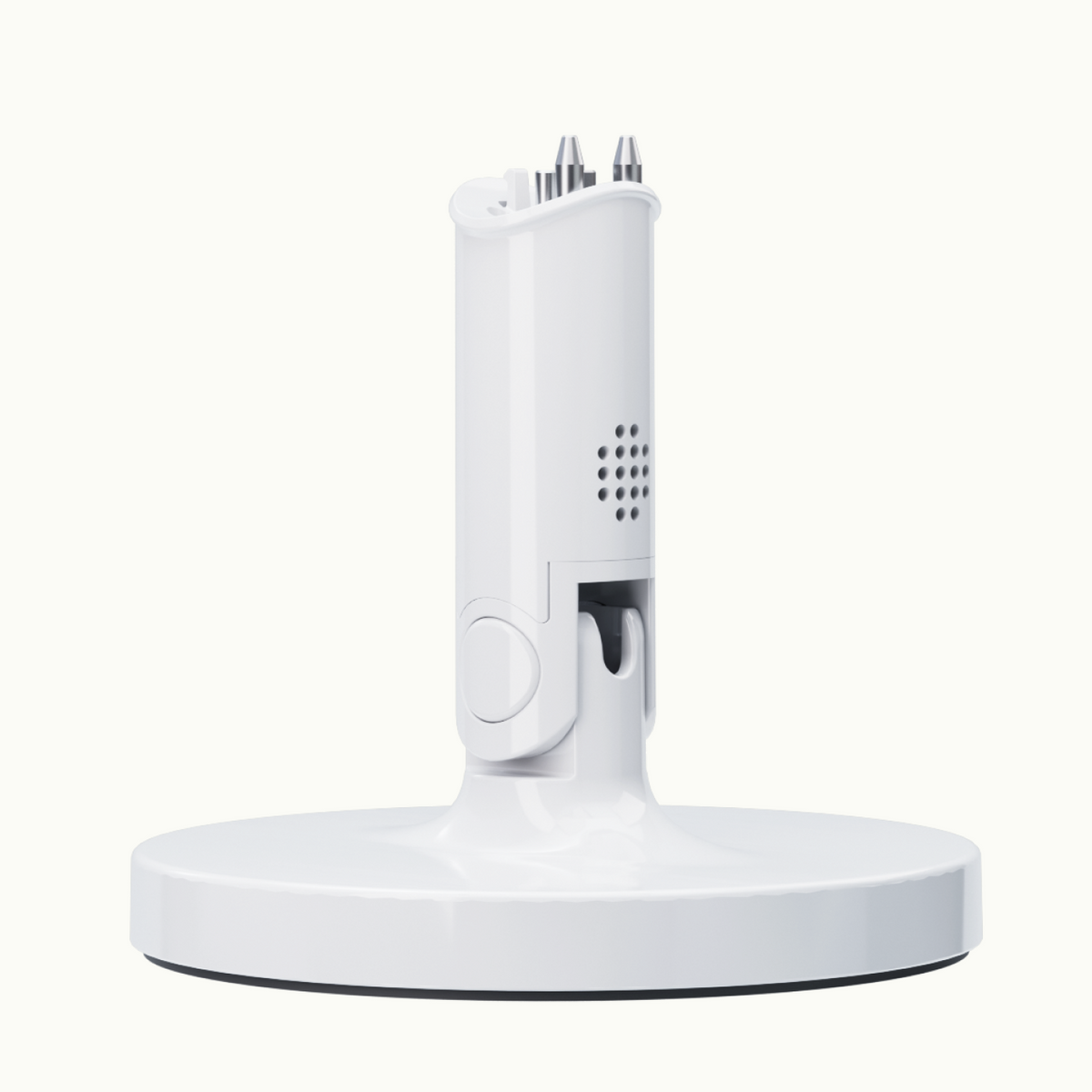You know the look—the scrunched-up face, the tiny clenched fists, the wiggling and squirming…yup, your baby has gas. You put your little one over your shoulder and gently pat their back until, finally, they burp. Sweet relief.
Burping your baby seems like one of the most elemental parenting tasks. But have you ever wondered why it’s necessary? Read on.
Understanding the need for burping
Why do you have to burp babies?
When babies eat, they swallow their food, but they also swallow small amounts of air. This air becomes trapped gas that babies must release. Trapped air won’t harm your baby, but it can cause them discomfort. Burping them is an efficient way to expel excess gas from their digestive tract, helping them feel more comfortable and alleviating crying or fussiness after feeding times. It’s easiest to expel gas the same way it entered: out the mouth, by burping.
Since babies’ digestive tracts are still developing, they’re not always able to burp by themselves. That’s where you come in.
When bottle feeding first became popular, parents began burping their babies more regularly. Bottles allow babies to swallow milk—and air—faster.
To be clear, not all babies need to be burped. According to a 2014 study, babies can expel trapped air on their own. So while burping relieves any discomfort your baby may feel after a feeding, it isn’t always a required part of feeding time.
But because burping provides soothing comfort—and can be a huge help for fussy, crying babies—experienced parents and physicians alike recommend burping for all babies.
Why your baby may need extra burping
All babies can benefit from being burped, but some need it more than others. Your baby might need to be burped more often depending on:
- Age. Generally, only babies under 9 months old need to be burped. Why not older babies? Newborns and infants haven’t developed enough to burp themselves effectively. Once your baby has grown more, they’ll swallow less air and be more easily able to expel it on their own.
- Feeding method. How often your baby needs to be burped also depends on whether you bottle-feed or breast-feed. With bottle-fed babies, it’s recommended that you burp your baby after they consume about two to three ounces of formula. If breastfeeding, burp your baby in between switching breasts. For especially gassy babies, burp them after each ounce of formula or every five minutes during breastfeeding.
- Feeding speed. Ever noticed that when you eat too fast, you burp more? This happens to babies too. If your baby eats quickly, they likely swallow even more air than usuall and require more burping.
- Colic. Colic is a condition where an otherwise healthy baby cries continuously for three or more hours a day. Frequent crying can also cause your baby to swallow air. Help them to release it by burping them.
- Airflow. Whenever babies breathe more through their mouths, if they have a stuffy nose, for example, they can swallow more air than normal, requiring some extra burping.
What happens if you don’t burp your baby
An un-burped baby won’t necessarily end up in the doctor’s office, but they may experience unpleasant symptoms such as:
- Tummy aches. Trapped air builds pressure within the digestive tract, creating discomfort (in other words, a tummy ache).
- Crying. When babies feel uncomfortable, they tend to cry. Trapped air may even contribute to excessive crying or colic.
- Trouble sleeping. Discomfort from trapped air can also disrupt your baby’s sleep—and yours.
Remember: Burping is not a forever thing, and it is not for every baby. If you choose to burp your baby, you only need to burp them for the first four to nine months or so. During that time, though, burping provides consistent relief that your baby can only achieve with your help.
The benefits of burping your baby
Burping makes feeding times, nap times, and bedtimes more comfortable for your little one—so, yes, a lot of their day and night. And while burping won’t solve all your baby’s problems, it might solve a lot of them. Here are the main benefits:
- Eases discomfort. Trapped air creates unpleasant pressure in the baby’s stomach, which can trigger fussing, crying, and all-around grumpiness. Taking a few minutes to help your baby ease that pressure by burping will restore their naturally bubbly nature.
- Prevents colic. When babies cry, they swallow air. When they swallow air, they cry. Burping can disrupt this unfortunate cycle by breaking up and releasing trapped air. Some experts disagree on whether burping truly lowers colic episodes, but it’s worth a try especially since burping won’t cause any harm.
At the end of the day, you never want to see your baby in discomfort or distress. Burping is a quick and simple way to help with both.
Tips for burping your baby
Burping your baby safely and effectively will enhance its benefits for you and your baby. Follow these tips on how to burp your baby:
- Notice the signs that your baby needs to burp. Your baby communicates with sounds and body language. Common indicators that a baby needs burping include fussing, spitting up, unlatching, arching their back, and pulling their legs up to their chest.
- Switch it up. If your baby hasn’t bubbled or belched after a few minutes of burping, move them into a different burping position and try again for another few minutes.
- Know when to stop. Sometimes, a baby simply doesn’t need to burp. If you’ve been at it for more than five minutes without a sound and are wondering how long to burp a baby, it’s okay to stop. You can stop burping your baby altogether when they can sit up well without assistance—anywhere between four and nine months.
How to reduce the need for burping
Burping relieves built-up gas that your baby might have taken in while feeding. Use these strategies before and during feeding to minimize your baby’s gassy tendencies:
- Feed your baby before full hunger sets in. Hungry babies eat faster, increasing the amount of air they swallow and the need to be burped. Feeding your little one before they reach this point can promote calmer, slower feeding.
- Hold baby upright when feeding. If you’ve ever attempted to eat while on your back, you know how challenging it is. Lactation experts recommend holding your baby upright at a 45-degree angle or more when feeding. You can use a pillow for support to prop up your baby.
- Ensure a good latch. When your baby forms a tight mouth seal around the breast or bottle nipple, it reduces the chances of air entering their digestive tract.
- Keep baby calm before and during feedings. Overstimulation can increase air swallowing and instances of spitting up.
As your baby grows, air swallowing and burping will become less of a concern. For now, you can make feeding times more manageable by reducing the need for burping and spitting up.
Nanit's role in educating new parents
Nanit has invaluable educational resources for new parents like you, helping provide you with with tips and care advice tailored specifically for your little one. The Nanit Pro Camera tracks your baby’s sleep and movement patterns in real-time, helping you achieve peace of mind and a sounder sleep for the whole family.
This personalized baby data lets you parent with less worry and more confidence. And our Pro Parent Blog offers insightful, science-backed parenting knowledge you can trust.
Key takeaways
- Babies swallow air, creating uncomfortable pressure. When babies feed or cry, they tend to swallow gulps of air that then get trapped in their digestive tract. This air can build internal pressure in your baby’s tummy, leading to discomfort, fussing, crying, and difficulty sleeping.
- Burping helps babies expel trapped air. Not all babies can expel trapped air on their own. You can lend a hand—literally!—by gently tapping or rubbing their back until they burp.
- Minimize burping needs. Feeding your baby more frequently, holding them upright during feedings, and helping them to latch properly are all effective burp-reducing strategies.
Sources:
Pathways.org. How to Burp A Baby—and Why They Need to Burp. https://pathways.org/how-to-burp-baby-and-why/
The Lactation Network. Let’s Talk About Baby Burps. https://lactationnetwork.com/blog/lets-talk-about-baby-burps/
Child: Care, Health, and Development. A randomized controlled trial of burping for the prevention of colic and regurgitation in healthy infants. https://pubmed.ncbi.nlm.nih.gov/24910161/
Nationwide Children’s. Gastroesophageal Reflux Disease (GERD) in Infants. https://www.nationwidechildrens.org/conditions/gastroesophageal-reflux-disease-gerd-in-infants
The Bump. How to Burp a Baby. https://www.thebump.com/a/how-to-burp-a-baby



